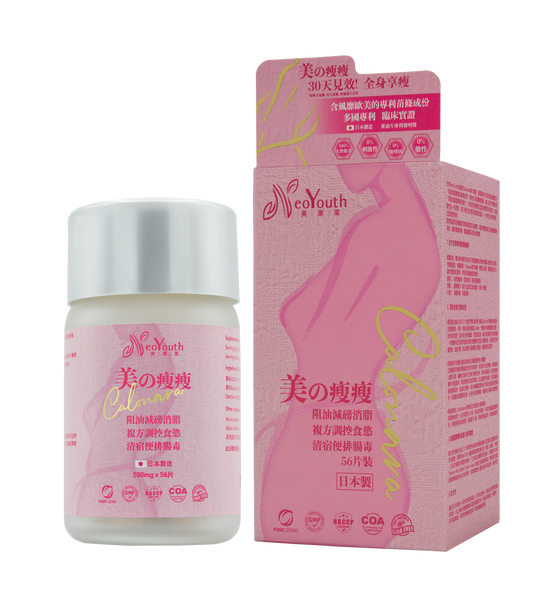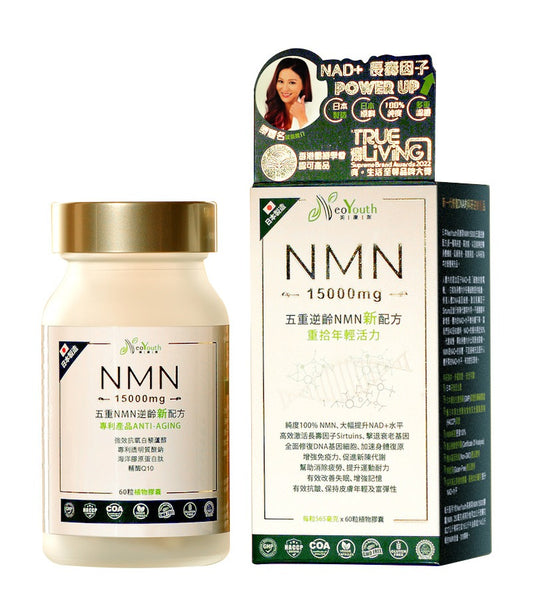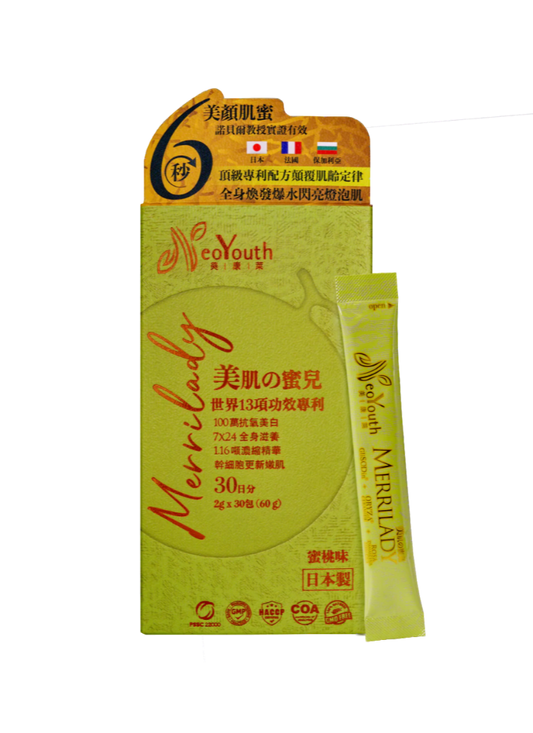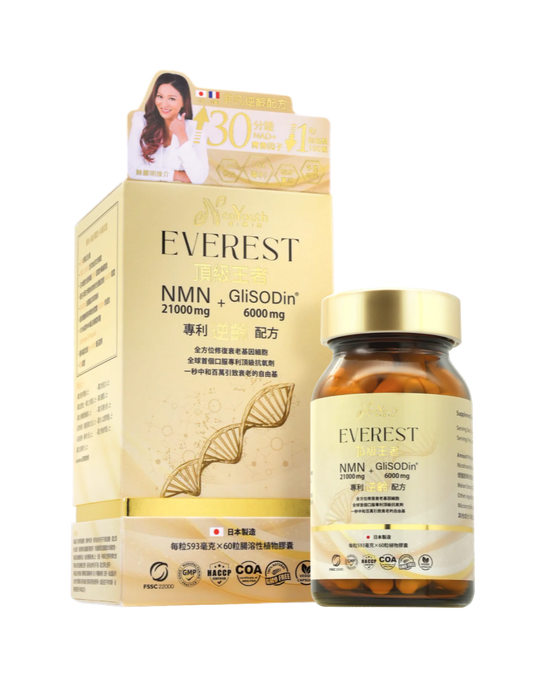Mitochondria are responsible for providing energy to cells and maintaining normal bodily functions. However, with age and unhealthy lifestyle habits, mitochondrial function gradually declines, leading not only to fatigue but also potentially to various chronic diseases. Consuming mitochondrial health supplements or products (such as NMN ) can effectively repair mitochondria , increase their activity, and thus enhance their function. This article will explore the impact of mitochondrial health on the human body and introduce how to repair mitochondrial function using ingredients such as NMN .
What are mitochondria?
Mitochondria are the energy factories in cells. Their core function is to convert nutrients into adenosine triphosphate (ATP) through oxidative phosphorylation, which is the main energy source required for cell activity. In addition to producing energy, mitochondria are also responsible for transmitting important intracellular signals and assisting in regulating cell division, growth or repair. Mitochondria are not only an energy source, but also key to cell health and stable functioning. [1]
Causes of mitochondrial dysfunction
Mitochondria are the energy source for cells, but they are also susceptible to stress, lack of sleep, and environmental toxins. These factors cause the body to produce a large number of free radicals, which attack the inner membrane of mitochondria and DNA, leading to functional degeneration. If the body is under oxidative stress for a long time, even if the "autophagy" mechanism is activated to clear aging or damaged mitochondria , it is difficult to repair or regenerate them, resulting in the accumulation of damaged mitochondria.
When the number and activity of mitochondria decrease, the cell's ability to produce energy also declines, leading to fatigue, metabolic disorders, and even an increased risk of chronic diseases such as diabetes and cardiovascular disease. To slow down aging and maintain health, it is essential to reduce mitochondrial damage at its source and support its repair and regeneration.
Mitochondrial dysfunction can lead to a variety of diseases.
Mitochondria produce energy for the body's cells, enabling organs to function properly. If mitochondria malfunction or decline in function, reduced energy production leads to cellular dysfunction, apoptosis, and various diseases. Mitochondria dysfunction has a significant impact on neurological, cardiovascular, and brain-related diseases. Increasing and repairing mitochondria can prevent these diseases, including:
Neurodegenerative diseases
Mitochondria are widely distributed in nerve cells and are key to maintaining nerve signal transmission and cell metabolism. If mitochondria cannot produce energy normally, it will cause neuronal function decline and cell apoptosis, which in turn promotes neurodegenerative diseases such as Alzheimer's disease, Parkinson's disease and Huntington's disease. [3]
Cardiovascular disease
Cardiac cardiomyocytes have extremely high energy requirements, and abnormal mitochondrial function can affect the efficiency of cardiac contraction and blood circulation, leading to impaired cardiac cardiomyocyte function. This is closely related to cardiovascular diseases such as heart failure, arrhythmia, and ischemic heart disease. Therefore, increasing the number of mitochondria may improve myocardial function and maintain cardiovascular health.
Metabolic diseases
The processes of glucose and fat metabolism are also related to mitochondria. When mitochondria in the pancreas are damaged, insulin secretion efficiency decreases, leading to abnormal blood sugar control. This is a major contributing factor to type 2 diabetes, metabolic syndrome, obesity, and other diseases. Repairing mitochondria helps improve cellular metabolic efficiency and maintain stable bodily functions.
Weakened immune function
The activity of immune cells depends on sufficient mitochondrial energy support. When mitochondria are imbalanced, the immune response is weakened, making the body more susceptible to viral or bacterial infections, and may also affect the stability of the autoimmune system, leading to a chronic inflammatory state. [2]
cancer
Mitochondria play a crucial role in regulating cell life and death (apoptosis). When mitochondria lose control over apoptosis mechanisms, abnormal cells may be unable to initiate their self-cleaning processes, leading to uncontrolled proliferation of cancer cells and ultimately tumor formation. Mitochondriatric dysfunction may also alter the metabolic environment of tumor cells, contributing to cancer progression.
How to increase and repair mitochondria ?
Increasing , repairing, and restoring the normal function of mitochondria can not only boost energy levels but also help slow down the aging process. Here are some effective methods to increase the number of mitochondria and restore their function, promoting mitochondrial health and improving their efficiency.
Supplementing the nutrients needed by the mitochondria
To increase or repair mitochondria, various nutrients are needed, such as B vitamins, magnesium, iron, and coenzyme Q10. These components promote energy metabolism, ATP production, and antioxidant responses, and are essential nutrients for maintaining the number and function of mitochondria.
Implement intermittent fasting
Intermittent fasting can stimulate autophagy in mitochondria, helping to clear aging and damaged mitochondria, making room for new mitochondria, thereby increasing mitochondrial density and cellular energy efficiency, and is also one of the important mechanisms of mitochondrial repair .
Regular exercise
Exercise stimulates mitochondrial biosynthesis, increasing the number and efficiency of mitochondria . High-intensity interval training (HIIT) and aerobic exercise, in particular, improve cellular energy metabolism, naturally promoting mitochondrial growth and repair . Regular exercise also enhances the body's antioxidant defenses, slowing age-related mitochondrial decline.
Reduce environmental toxins
Heavy metals, pesticides, and plasticizers in the environment can damage mitochondrial membrane structure, leading to impaired energy metabolism and decreased cell function. Avoiding processed foods, choosing organic ingredients, and using non-toxic household products are important steps in initiating mitochondrial repair .
Managing stress and improving sleep quality
Chronic stress and sleep deprivation can inhibit mitochondria's self- repair and functional maintenance, leading to decreased energy and accelerated aging. Relaxing the nervous system through methods such as meditation and breathing exercises can help mitochondria restore normal function and is one of the most natural ways to repair and increase mitochondria .
Consume antioxidant foods
Free radicals are one of the main causes of mitochondrial damage, and antioxidant foods can reduce this damage and promote mitochondrial repair . Foods rich in polyphenols, anthocyanins, and vitamins C and E, such as berries, green tea, and dark green vegetables, help reduce oxidative stress. Consistent intake of these nutrients contributes to long-term mitochondrial health and regeneration.
Controlling blood sugar and insulin
High blood sugar and high insulin levels can cause mitochondria to be in an overactive state for extended periods, affecting their repair efficiency. Adjusting dietary structure and controlling carbohydrate intake can prevent mitochondria from becoming overloaded, restoring the increase in mitochondrial numbers and repair efficiency.
Recommended nutrients and health supplements for mitochondria
Proper nutrient supplementation can help increase mitochondria and promote repair . Several studies have confirmed that the following nutrients have positive effects on maintaining mitochondrial function. However, when taking mitochondrial health foods and supplements , attention should still be paid to the possibility of interactions with other drugs, and it is recommended to consult a professional doctor before starting supplementation. [4]
Vitamin B
Vitamins B1 through B12 are essential nutrients for maintaining normal mitochondrial function. Among them, vitamin B1 (thiamine) helps initiate the mitochondrial energy cycle; B2 (riboflavin) and B5 (pantothenic acid) affect energy production efficiency; B3 (niacin) promotes NAD+ synthesis, further increasing mitochondrial activity and cellular energy; and B9 (folic acid) plays a key role in mitochondrial repair and synthesis, maintaining mitochondrial stability.
Food sources: lean meat, pork liver, eggs, brown rice, beans, nuts, whole grains, and dark green vegetables.
L-carnitine
L-carnitine is responsible for delivering fatty acids into the mitochondria, which is crucial for improving mitochondrial energy efficiency. It is essential for fat metabolism and energy production. Furthermore, it helps remove toxic metabolites from the mitochondria, making it an important nutrient for enhancing mitochondrial efficiency and replenishing its energy.
Food sources: red meat (beef, lamb), pork, chicken, fish, dairy products.
Coenzyme Q10 (CoQ10)
CoQ10 is responsible for transporting electrons in the electron transport chain within mitochondria, promoting ATP synthesis. It also has antioxidant properties, reducing free radical damage to mitochondria. Moderate intake helps delay aging and repair mitochondrial function , making it a core ingredient in mitochondrial health supplements .
Food sources: deep-sea fish (tuna, mackerel), animal offal (especially heart and liver), peanuts, sesame seeds, spinach.
α-Lipoic acid (ALA)
ALA is a powerful antioxidant with dual solubility (lipid-soluble and water-soluble), allowing it to penetrate deep into cells and mitochondria to eliminate oxidative stress and recycle other antioxidants such as vitamins C and E. ALA supplementation helps reduce mitochondrial damage and promotes the repair process, making it an essential nutrient for improving mitochondrial health .
Food sources: spinach, cauliflower, carrots, potatoes, beets, liver.
Selenium and Zinc
These two trace elements support the mitochondrial antioxidant system, preventing free radicals from damaging mitochondrial structure. Zinc also participates in DNA repair and cell division, and is a key element in maintaining the integrity of mitochondrial genes. Ingesting selenium and zinc through a daily diet helps mitochondria replenish nutrients and maintain stable function.
Food sources: Brazil nuts (selenium), oysters (zinc), pumpkin seeds, whole grains, seafood, eggs.
antioxidants
During energy production, mitochondria release free radicals. Excessive accumulation of these free radicals can damage mitochondria and even lead to cell death. Natural antioxidants such as polyphenols, anthocyanins, and flavonoids help eliminate free radicals and slow down mitochondrial aging. Many mitochondrial health supplements contain antioxidants, which aid in mitochondrial repair and regeneration, maintaining overall cellular health.
Food sources: blueberries, cranberries, dark chocolate, green tea, red grapes, tomatoes, dark green vegetables (such as kale and purple cabbage). [5]
NMN and mitochondria are key to anti-aging.
As can be seen from the functions of mitochondria above, they are the core of the body's energy production and participate in cell repair, anti-oxidation, and immune regulation, playing a crucial role in delaying aging. Supplementing mitochondria with the necessary nutrients through diet or health supplements can effectively enhance their activity and promote mitochondrial repair . Among these, NAD+ is a key coenzyme in cellular energy metabolism, determining the rate and extent of cellular aging.
As a precursor to NAD+, NMN (nicotinic acid mononucleotide) has been shown to effectively increase the level of NAD+ in the body, especially when the NAD+ content gradually declines with age. Supplementing with NMN can help restore mitochondrial energy metabolism and stability. According to research by the National Institutes of Health, NMN can promote the synthesis of NAD+, thereby activating the longevity protein SIRT3 in mitochondria. This protein is crucial for maintaining mitochondrial structure and function, scavenging reactive oxygen species, and stabilizing the intracellular environment. [5] This means that through the synergistic effect between NMN and mitochondria , it can help reduce mitochondrial stress, improve functional decline, and achieve the effect of delaying cell aging.
In addition, NAD+ is also a key factor in regulating the activity of longevity proteins (such as SIRT1 and SIRT3), which are involved in anti-aging mechanisms such as antioxidation, inflammation control and gene stabilization. Therefore, NMN supplementation can not only increase mitochondrial activity, but also help to activate the body's anti-aging function. Therefore, the synergistic effect between NMN and mitochondria has become one of the core keys of modern anti-aging research. [6]
For NMN mitochondrial health supplements , Everest is the top choice, the undisputed king.
Mitochondria are the energy factories of cells. When their function is imbalanced, it can lead to various age-related discomforts such as fatigue, memory decline, and muscle weakness. Supplementing with mitochondrial health foods , such as Everest NMN 21,000mg + GliSODin® 6000mg from Japan , can help repair and strengthen mitochondria at the cellular level, achieving true anti-aging. Product features are as follows:
-
High-efficiency NMN ingredient: NAD+ is the core component for increasing mitochondrial activity. Supplementing with NMN allows for rapid conversion into NAD+, helping to activate mitochondria , promote cell repair and energy metabolism, and simultaneously delay age-related functional decline.
-
French patented SOD antioxidant enzyme: GliSODin® effectively combats free radical damage, reduces mitochondrial oxidative stress, protects cells from environmental and aging effects, and achieves internal and external balance, anti-aging and delaying effects.
-
Pure and highly absorbable formula: 100% high-purity NMN combined with enteric-coated capsule design, free of pesticides, heavy metals and additives, helps nutrients reach the intestines for absorption, improves mitochondrial replenishment efficiency, and allows each capsule to fully perform its function.
-
Made with rigorous Japanese standards: Carefully selected raw materials with dual patents from France and Japan, and manufactured locally in Japan, passing multiple quality and safety tests, making it a reliable choice for mitochondrial health supplements .
-
Simple daily supplementation: Just 1 to 2 capsules a day are enough to easily supplement mitochondrial nutrition, maintain cell health, and are suitable for long-term use to condition the body, delay aging, and improve quality of life.
If you want to fundamentally enhance your physical strength and vitality, or are facing age-related energy decline and physical degeneration, Everest NMN 21,000mg + GliSODin® 6,000mg from Japan is your top choice for creating a youthful state and repairing mitochondria .
Healthy mitochondria contribute to longevity and overall health
You are likely already aware of the importance of mitochondria to the human body; they are one of the core components for maintaining normal bodily functions. When mitochondria malfunction, it can lead to fatigue, premature aging, and even various chronic diseases. Therefore, increasing mitochondrial activity and restoring their function is crucial. You can enhance mitochondrial health by adjusting your lifestyle and diet. If you are deficient in specific nutrients, you can rely on mitochondrial supplements and health foods such as NMN to replenish the necessary nutrients and further help maintain normal bodily functions.
References:
1. MedicalNewsToday - What are mitochondria?
2. Taiwan Mitochondrial Industry Development Promotion Association - Mitochondria and Aging-Related Diseases
3. ScienceDirect - The role of mitochondrial dysfunction in Huntington's disease: Implications for therapeutic targeting
4. Nutrition Diets - 7 Ways To Support Your Mitochondria For Better Health & Ageing
5. Dr. Deanna Minich - What to Eat to Fuel a Healthy Mitochondria
6. National Institutes of Health - Nicotinamide Mononucleotide Supplementation Improves Mitochondrial Dysfunction and Rescues Cellular Senescence by NAD+/Sirt3 Pathway in Mesenchymal Stem Cells





